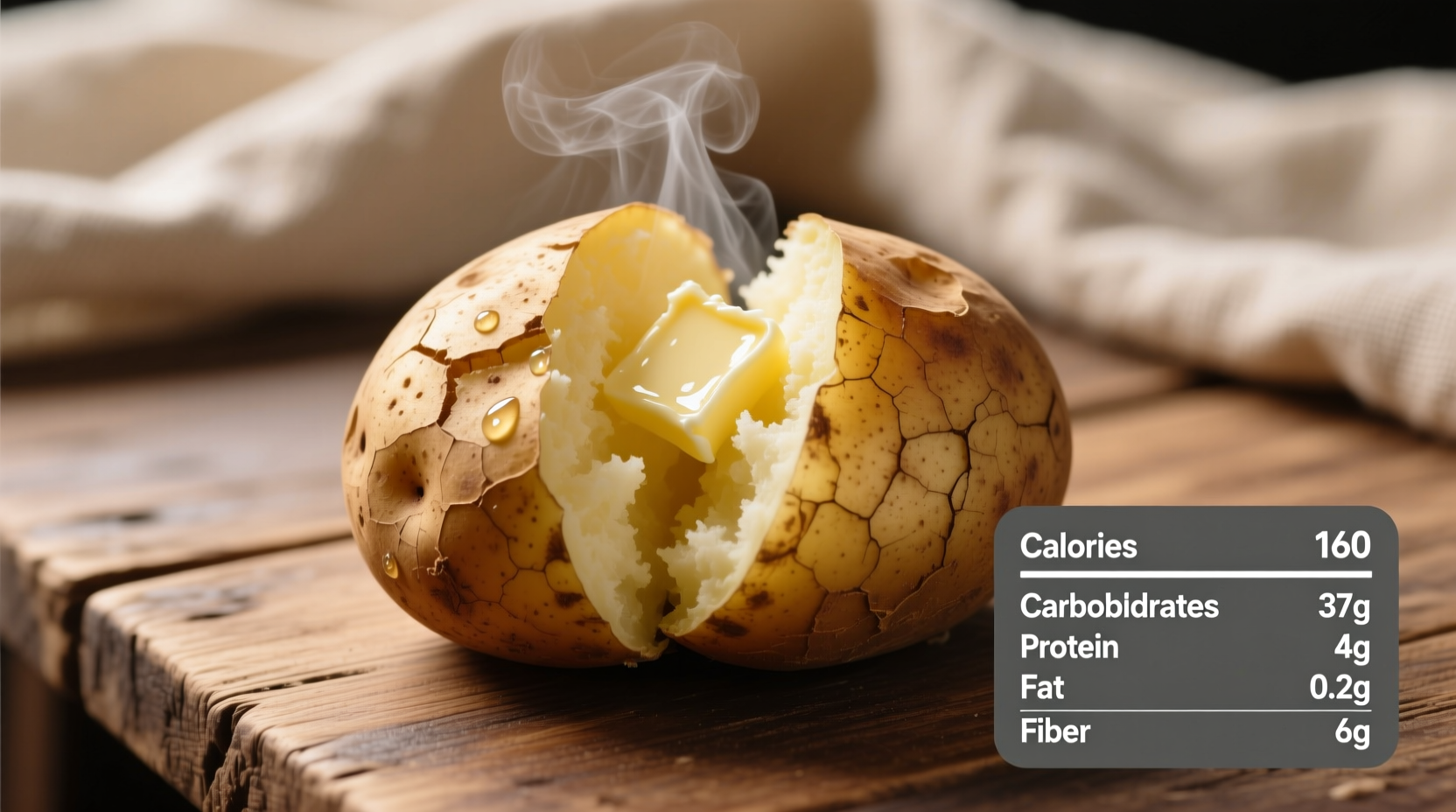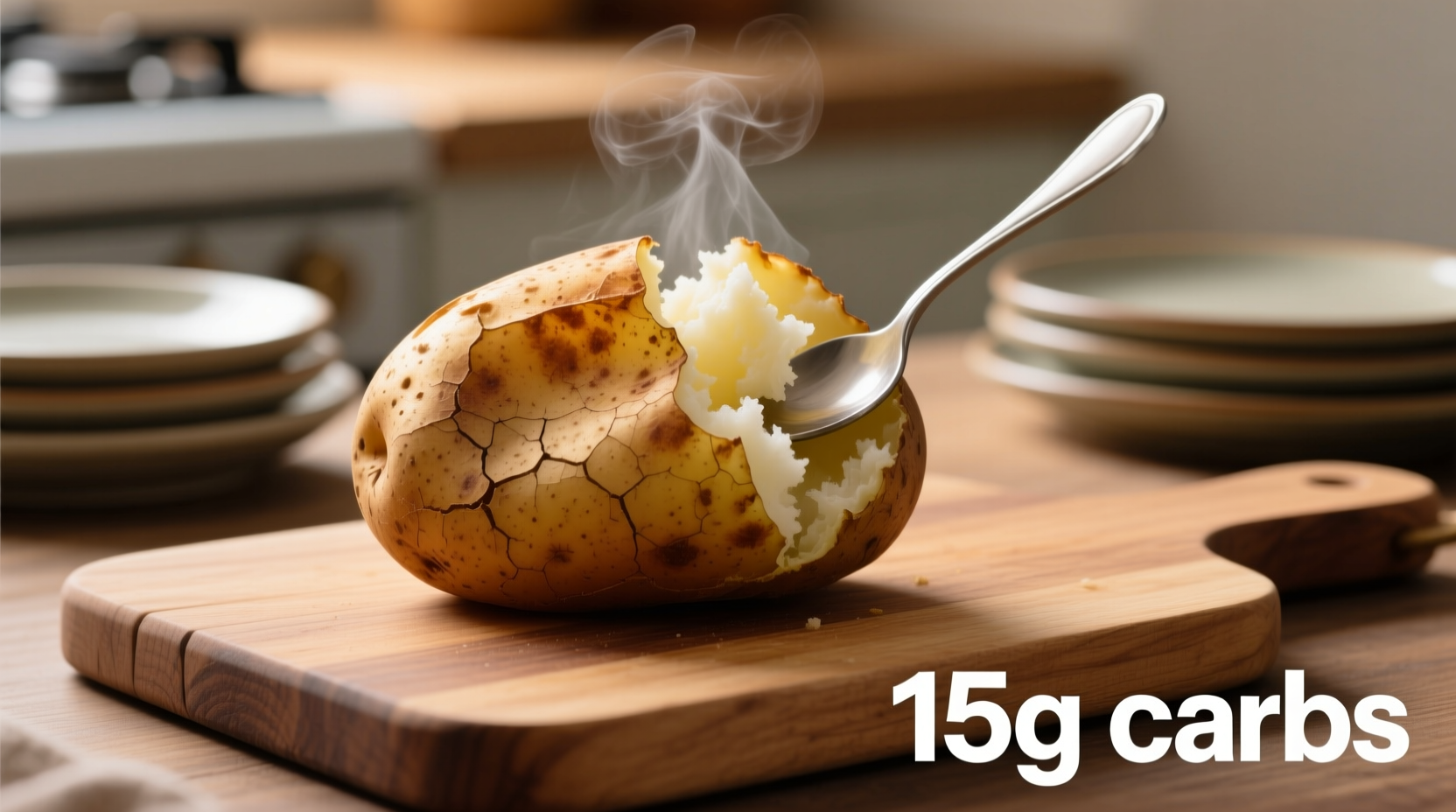Understanding the precise carbohydrate content of staple foods like potatoes is essential for effective meal planning, whether you're managing diabetes, following a specific diet, or simply tracking your nutritional intake. Let's explore this common dietary question with the accuracy and context you need for informed food decisions.
What Defines a Medium Baked Potato?
Before examining carb content, we need to clarify what constitutes a "medium" potato, as size dramatically impacts nutritional values. According to USDA standards:
| Size Category | Weight (grams) | Approximate Dimensions | Total Carbohydrates |
|---|---|---|---|
| Small | 138g | 2-1/4" diameter | 32.0g |
| Medium | 150g | 2-3/4" diameter | 34.8g |
| Large | 250g | 3-1/4" diameter | 58.0g |
This standardized measurement comes from the USDA FoodData Central database, the most authoritative source for nutritional information in the United States. When tracking your intake, remember that actual potato sizes can vary significantly based on variety and growing conditions.
Breaking Down Potato Carbohydrates
Not all carbohydrates affect your body the same way. Understanding the composition helps make informed dietary choices:
- Starch (31.2g) - The primary carbohydrate in potatoes, providing sustained energy
- Dietary Fiber (2.6g) - Important for digestive health and reducing net carb impact
- Sugars (1.0g) - Naturally occurring simple carbohydrates
The concept of "net carbs" (total carbs minus fiber) matters significantly for those following low-carb diets. For a medium baked potato, this results in 32.2g of net carbs. This distinction is crucial because fiber doesn't impact blood sugar levels like other carbohydrates.

How Preparation Affects Carb Content
While the question specifically asks about baked potatoes, it's valuable to understand how different preparation methods impact carbohydrate availability:
- With skin - Retains maximum fiber content (2.6g in medium potato)
- Without skin - Loses approximately 30% of fiber content
- Cooled after cooking - Develops resistant starch, reducing net carb impact by 15-20%
- With common toppings - Butter adds fat but no carbs; sour cream adds minimal carbs; bacon bits add about 1g per tablespoon
Research published in the American Journal of Clinical Nutrition shows that cooling cooked potatoes increases resistant starch content, which functions more like fiber in the body. This simple technique can reduce the glycemic impact of potatoes by nearly one-fifth.
Putting Potato Carbs in Context
Understanding how potato carbohydrates compare to other common foods helps with meal planning:
- Medium baked potato: 34.8g total carbs (32.2g net)
- 1 cup cooked white rice: 45g total carbs (44g net)
- 1 medium banana: 27g total carbs (24g net)
- 1 slice whole wheat bread: 17g total carbs (15g net)
- 1 cup cooked quinoa: 39g total carbs (34g net)
While potatoes contain significant carbohydrates, they also deliver substantial nutritional benefits often missing in other carb sources. A medium baked potato provides:
- 27% of your daily potassium needs (more than a banana)
- 33% of your daily vitamin C requirement
- Significant amounts of vitamin B6, manganese, and magnesium
- Naturally fat-free and cholesterol-free
Practical Guidance for Different Dietary Needs
Your approach to potato consumption should align with your specific health goals:
For Low-Carb and Keto Dieters
At 32.2g net carbs, a medium baked potato exceeds the daily carb limit for strict ketogenic diets (typically 20-50g total). Consider these alternatives:
- Use cauliflower as a lower-carb substitute (3g net carbs per cup)
- Try smaller portions (1/2 potato = ~16g net carbs)
- Focus on cooling potatoes to increase resistant starch content
For Diabetes Management
Potatoes have a moderate to high glycemic index (70-85), but their impact can be managed:
- Eat potatoes with protein and healthy fats to slow glucose absorption
- Choose to eat cooled potatoes to increase resistant starch
- Always consume with the skin for maximum fiber content
- Pair with vinegar-based dressings, which research shows can lower post-meal blood sugar spikes
For Active Individuals and Athletes
The carbohydrate content in potatoes makes them excellent for:
- Pre-workout fueling 2-3 hours before exercise
- Post-workout glycogen replenishment
- Providing sustained energy for endurance activities
- Delivering potassium to prevent muscle cramps
Common Misconceptions About Potato Carbs
Several myths persist about potato nutrition that deserve clarification:
- "Potatoes are just empty carbs" - False. Potatoes provide significant potassium, vitamin C, and other nutrients per calorie compared to many other carb sources.
- "All potatoes have the same carb content" - False. Varieties differ: Russets (most common for baking) have slightly more carbs than Yukon Golds or red potatoes.
- "Sweet potatoes are always lower in carbs" - Not necessarily. A medium sweet potato (130g) contains about 27g total carbs (24g net), slightly less than white potatoes but still substantial.
Maximizing Nutritional Value While Managing Carbs
Implement these practical strategies to enjoy potatoes while managing carbohydrate intake:
- Portion control - Stick to 1/2 to 1 small potato (100-130g) for moderate carb intake
- Cool before eating - Refrigerate cooked potatoes for 24 hours to increase resistant starch by up to 20%
- Keep the skin on - The skin contains nearly half the fiber content
- Pair wisely - Combine with protein and healthy fats to moderate blood sugar response
- Track accurately - Weigh your potatoes rather than estimating size for precise carb counting
Remember that individual responses to carbohydrates vary significantly. Continuous glucose monitoring studies show that some people experience minimal blood sugar impact from potatoes while others see significant spikes. Personal experimentation combined with professional guidance yields the best results for your specific physiology.











 浙公网安备
33010002000092号
浙公网安备
33010002000092号 浙B2-20120091-4
浙B2-20120091-4